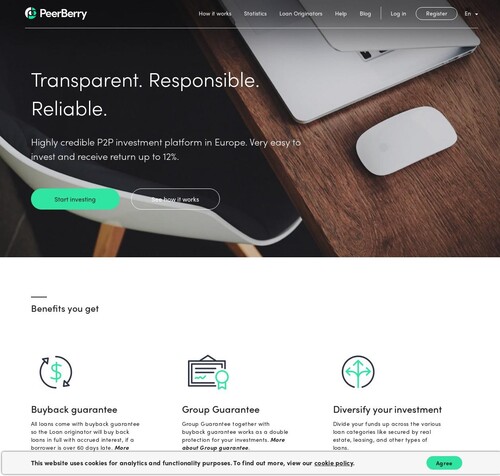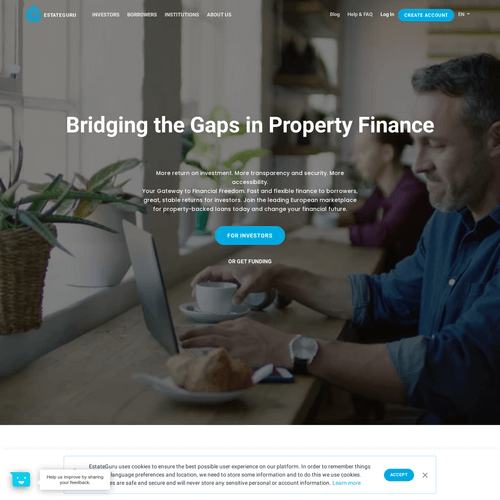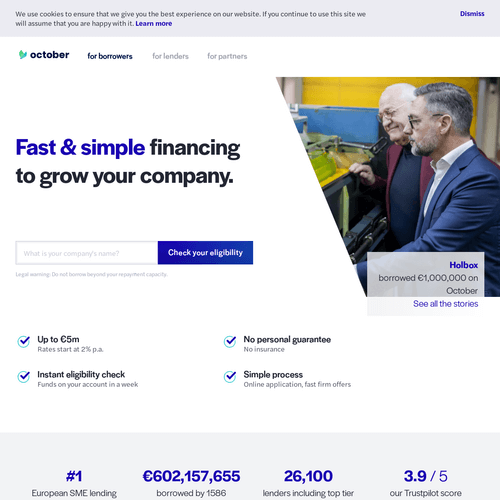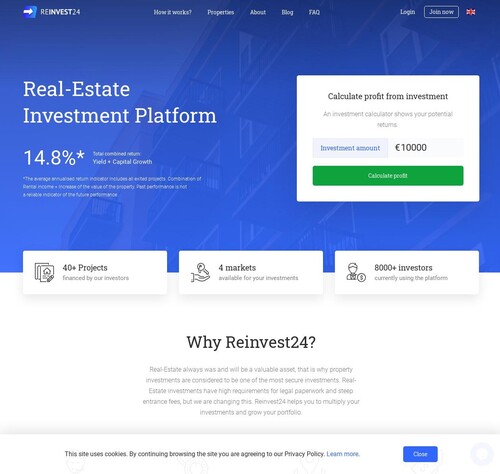P2PIncome | Why is Peer-to-Peer Lending High Risk?
Peer-to-peer lending is considered high risk mainly because of the social stigma surrounding lending money. Many critics of peer-to-peer lending often invoke the reality that a substantial amount of borrowers default on their loans. Statistics would imply that an estimated 20% of borrowers in the US are prone to default on their loan. A 20% chance that you may never see your money again for only a 10% yearly increase may not seem like the most lucrative business opportunity.
This rationale has made investors skeptical of putting their finances in a system which in their eyes is doomed to fail. However, peer-to-peer lending and the use of microfinance is utilized for this very purpose. The ingenuity that comes with utilizing multiple investors for one borrower and managing risk in such a fashion has already successfully processed billions of dollars in a short manner of time. Peer-to-peer investors have already understood the benefits that come along side using microfinance business models to generate more liquidity in financial markets. But why isn't everyone doing it? There is still a lot of doubt in the industry despite proven efforts, methods and track records.
In this guide we will be reviewing which platforms mitigate risk and why they can be trusted as investment services.
PeerBerry
PeerBerry is currently one of the fastest growing peer-to-peer lending platforms in Europe. They have risen to success due to various reasons and business decisions. PeerBerry utilizes a state of the art platform with a sophisticated yet easy to use auto-investing tool. The lending platform also has a zero percent default rate and track records would indicate high yields at minimal risk.

PeerBerry was created by parent company Aventus Group, a successful lending group in Europe. Prior to PeerBerry, Aventus worked closely with loan originator aggregator, Mintos, after seeing the success on Mintos' marketplace, Aventus decided to create their own peer-to-peer lending platform. And thus, PeerBerry was born in 2017 in Latvia. To invest on PeerBerry there is a 10 EUR minimum investment and yearly returns range from 9 - 12 percent. PeerBerry differs from Mintos in a few ways that make them more secure than Mintos.
One of those strategies includes not providing the borrowers with the whole loan contract. Investors on PeerBerry are only able to invest into a minority fraction of whichever loan they choose. The loan originator funding the loan still manages the repayments from the borrower. This leaves all of the risk and control in the hands of the loan originators. Investors on PeerBerry are more taking a cut from an already profitable model. The second key difference is PeerBerry's dual buyback protocol which ensures that all borrowers and loan originators on PeerBErry are kept safe. The dual buyback guarantee ensures that if a loan goes more than 30 days late than the loan originator will buy back the loan from the investor with interest included. In the case that the loan originator himself is unable to process the loans he has issued, then all the loan originators pool in their resources to mitigate the damage. This in turn creates an investing environment with multiple layers of security designed into it's very fabric.
Other interesting notes to add about PeerBerry include that they primarily deal with consumer loans, but also do cater to others forms of loans. These loans include: business loans, mortgage loans and auto loans. PeerBerry has no secondary market so if liquidity is important to you then you can check our guide on investing in high liquidity platforms.
EstateGuru
EstateGuru is considered one of the top real estate crowdfunding platforms in Europe. They have been around since 2014 and have processed hundreds of millions of dollars in loans in countries all over Europe. In terms of real estate platforms, EstateGuru is the biggest, they have the highest number of investors, real estate projects, portfolio average and one of the lowest default rates. All the while, maintaining a very attractive return for their investors.

There is a 50 EUR investment requirement to purchase a loan on EstateGuru's marketplace. And 250 EUR to use EstateGuru's auto-investing tool. Investors can rest assured that EstateGuru has a great track record with zero defaulted loans and a very active secondary market. The crowdfunding platform has designated a great deal of resources to ensuring that the investments on their site are not subject to malpractice and error. EstateGuru's team comprises of financial, real estate and legal experts who maintain the lender/borrower ecosystem.
Other than a two percent fee there are no fees associated with using EstateGuru. All projects on EstateGuru are backed by either a 1st or 2nd rank mortgage and EstateGuru does it's best to make sure that borrowers can pay back their debts. This means that in the case of a defaulting borrower, EstateGuru reaches out to see if they can come to a more accommodating solution such as a debt restructuring. EstateGuru's tool can take time to properly process. We recommend frequent observation and optimization of the tool until it begins to fill out loans automatically. After which, it does a good job reinvesting loan contracts. Like many real estate based lending platforms, there is some cash drag to be expected as the loan pools are large and can take time to be filled.
October
October, formerly known as Lendix, is a peer-to-peer lending platform that deals with businesses in Europe. October is based in France and has funded hundreds of millions of dollars for small to medium sized enterprises (SMEs) in Europe. October is a well-trusted platform with a very impressive track record.

Out of the top performing and well-known platforms, Octobers offers a much lower interest yield. There are also no auto-investing algorithms and there is no secondary market. October believes that these practices only serve to weaken the peer-to-peer lending industry. They believe that the investors should be well-educated and informed on what they are investing into. October invests a great amount of resources into risk management and security protocols to ensure the investment process goes smoothly. October also operates with large European institutions such as the EU bank. October's objective is democratize finance in Europe. All of which can be achieved through a 20 EUR minimum entry deposit and the rates range between 3 to 7 percent yearly.
October, like EstateGuru also has a zero percent default rate which they have been able keep by providing rigorous due diligence on the loan contracts they offer. October also provides a very handsome prize of 20 EUR for all investors upon deposit. Bonuses can make a great difference in your portfolio if invested wisely.
ReInvest24
Reinvest24 is a peer-to-peer lending platform with an innovative approach to property crowdfunding. Reinvest24, rather than using a conventional business model of putting loans for collateral, give property equity to lenders until the loan contract is paid off. This incentivizes investors because Reinvest24 is able to give two forms of earnings on one loan contract. The peer-to-peer lending platform is able to combine a lot of players to make business flourish and give everyone a piece of the pie.

At the heart of Reinvest24's success is their ability to select properties in Eastern Europe that are great value picks. Reinvest works closely with local partners to renovate and redesign properties so that they serve a purpose and make good income. All that considered, Reinvest24 does not have many investors on their platform, which causes a fair bit of cash drag in their marketplace. The platform has two marketplaces, and all loans are backed by a 1st rank mortgage. All loans are offered with their business plans as well as renovation papers so that investors may see the process of the project they have funded. Loans last from 6 months to 18 months, and then minimum investment entry is a 100 EUR, and yearly returns range from 11 to 15 percent. Reinvest24 also has a zero percent default rate.
To be fair, Reinvest24 is still a pretty young platform and it's investors count still remains small. The peer-to-peer lending platform still has time before it truly takes it's place among the top platforms, but its consistency has been remarkable so far. There is a bit of cash drag on Reinvest24, but that is to be expected of any real estate crowdfunding platform.

Market Type
Consumer Loans
Average Returns
9 - 12%
Minimum Investment
EUR 10
Signup Bonus
0.5%
Registered users
70,000
Total funds invested
EUR 1.8 Billion
Default rate
7%
Regulating entity
Self-Regulated/EU Compliant
Buyback guarantee
Secondary market
Payment methods
Bank Transfer, Bank Card, TransferWise
Withdrawal methods
Bank Transfer, Bank Card, TransferWise
PeerBerry is an excellent P2P platform to its 100 percent successful fund recovery track record. They offer slightly below market interest rates in exchange for a guarantee users will never lose their funds.

Market Type
Mortgage Loans
Average Returns
8 - 13%
Minimum Investment
EUR 50
Signup Bonus
0.5%
Registered users
150,000
Total funds invested
EUR 700 Million
Default rate
6%
Regulating entity
Bank of Lithuania
Buyback guarantee
Secondary market
Payment methods
Bank Transfer, SEPA, Credit Card, TransferWise
Withdrawal methods
Bank Transfer, SEPA, Credit Card, TransferWise
EstateGuru is a highly recognized and successful P2P Lending company. What makes EstateGuru as P2P Lender so profitable and secure? Explore the breakdown with P2PIncome's thorough analysis of EstateGuru's strengths and weaknesses.

Market Type
Business Loans
Average Returns
3 - 7%
Minimum Investment
EUR 20
Signup Bonus
EUR 20
Registered users
43,000
Total funds invested
EUR 1 Billion
Default rate
3%
Regulating entity
Self-Regulated/EU Compliant
Buyback guarantee
Secondary market
Payment methods
Bank Card, Bank Transfer, TransferWise
Withdrawal methods
Bank Card, Bank Transfer, TransferWise
October specializes in small risk business loans specifically to SME's in Europe. October has a great track record of fund recoveries, a solid mission and a very strong foundation. October's business and risk strategy is worth the time to read.

Market Type
Mortgage Loans
Average Returns
12 - 17%
Minimum Investment
EUR 100
Signup Bonus
EUR 10
Registered users
25,000
Total funds invested
EUR 40 Million
Default rate
0%
Regulating entity
Self-Regulated/EU Compliant
Buyback guarantee
Secondary market
Payment methods
Bank Transfer, Bank Card, TransferWise
Withdrawal methods
Bank Transfer, Bank Card, TransferWise
Reinvest24 is an equity backed real estate rental P2P lender. Though they are a much smaller P2P lending platform in comparison to the top P2P lenders. They deserve a high place on the list because of their attention to detail and successful execution of business goals.
How do I know if a Peer-to-Peer lending platform is high risk?
A peer-to-peer lending platform has a few telltale signs that make it advisable to be cautious when approaching. Always look for information, statistics, loan amounts, and make sure that the platform has a properly written terms and condition, and a way to contact customer support. There are many things you need to be prepared for vetting the platforms that you're going to use. Here are some basic steps you can take to filter out third rate platforms.
Step 1:
Check to see that the platform does proper KYC, and perform an actual query by contacting the customer service to see the level of support and response time. If the first response is not sent within 24 hours, that is a red flag. If the returning email has lazy mistakes, no formal greeting or signed name, that's another red flag.
Step 2:
Find out if the platform offers statistics of financial statements. If you are unable to find how many loans have been processed and how previous years faired for investors, that is a red flag.
Step 3:
Find out the default rate! If a lending platform has a default rate higher than 10 percent then that is a red flag. You should opt for platforms with a minimal default rate. For us, if the default rate is above seven, that's a hard no. You should expect your platform to have proper fund recovery strategies like mortgages or a buyback guarantee.
Step 4:
Does the business have a proper business model that seems profitable? That's very important in this regard! The platform has to be profitable in order for them to continue servicing your portfolio. If the platform itself does not make sense then you should not risk placing your capital with them.
Platforms to look out for:
- Iban Wallet
- RateSetter
- Grupeer
Verdict
Peer-to-peer lending is not a monolith. There are many variations of microfinance that are grouped under this financial umbrella of microfinance. Which, as it's name implies, uses micro-financial transactions to finance large scale projects.
Many of the platforms listed in this guide go above and beyond to ensure to their investors that using their platforms is safe for investors. These are not elaborate ponzi schemes where you'll find one day that your money is gone — but some platforms out there might be. We highly recommend doing your due diligence on all of the platforms you think are potential places for an investment. Platforms that are reluctant to provide transparency are platforms that should be treated with skepticism. Otherwise, the platforms on this list have been tested and reviewed and all have shown themselves to be reliable platforms for investing. Out of the four, PeerBerry would certainly be our strongest option for many reasons, but mostly due to the multilayered security investors can find with them.




